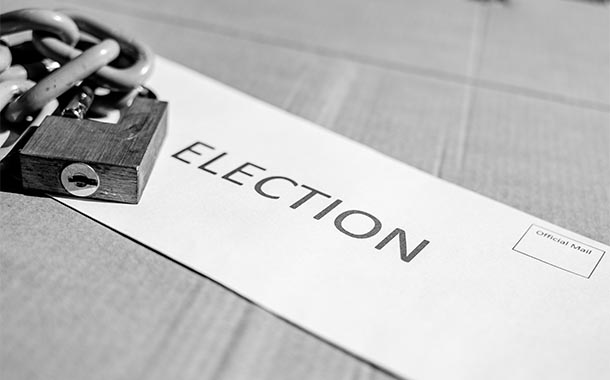
The Law, Policy, and Engineering initiative recently held “Election Security in the 2020 Election,” an academic panel discussion focused on addressing these election safety and security topics. IMAGE: ADOBE STOCK
Penn State Law, Policy, and Engineering hosts election security panel discussion
10/27/2020
By Samantha Chavanic
UNIVERSITY PARK, Pa. — With less than two weeks left until the 2020 election, officials across the United States are preparing for unique and unusual circumstances — increased mail-in voting, safety concerns related to in-person voting during the COVID-19 pandemic, security fears and foreign influence threats.
On Wednesday, Oct. 7, Penn State’s Law, Policy, and Engineering (LPE) initiative held Election Security in the 2020 Election, an academic panel discussion focused on addressing these election safety and security topics.
“Public confidence in this year’s election results is key to our democracy,” said Sandra Allain, director of LPE; professor of practice in the School of Engineering Design, Technology, and Professional Programs and lecturer in law. “This was an opportunity to highlight the importance of creating a voting plan to minimize security risks and make sure every vote counts. Valuable resources for voters were also shared, including the Vote&Home resource for absentee and mail-in ballots in all 50 states. This tool was developed by the Policy Innovation Lab of Tomorrow at Penn State Law, which is part of the LPE initiative.”
Panelist experts included Margaret Hu, associate dean for non-Juris Doctor (JD) programs at Penn State Law at University Park and professor of law and international affairs; Andrea Matwyshyn, associate dean for innovation and technology and professor of law and engineering policy at Penn State Law at University Park and professor in the School of Engineering Design, Technology, and Professional Programs; Patrick McDaniel, distinguished professor of computer science and engineering and the William L. Weiss Chair in Information and Communications Technology; and John Gastil, distinguished professor in communication arts and sciences and political science and senior scholar at the McCourtney Institute for Democracy. The event was moderated by Allain.
During the event, Hu described election security as having four primary categories of vulnerability: propaganda, psychological operations, criminal enterprise and cybercrime and cyberattack and cyberwarfare. She highlighted that the categories are not mutually exclusive and may overlap with each other.
“The right to vote, our political process, democracy itself, depends on our access and our execution of our right to vote,” Hu said.
McDaniel went on to explain the importance of understanding adversaries and the goals of adversaries when they attack elections: preventing voters from being able to vote, changing how the voters perceive the voting options, inhibiting or changing the counting of votes and creating distrust in the election process and its outcomes. These are accomplished in three main thrusts: cyberattacks, misinformation campaigns and distrust campaigns.
“It is truly an attack on the election to use misinformation or to use cherry-picked examples to create widespread mistrust in the election,” he said. “It’s very similar to just stuffing the ballot box. It changes the nature of the conversation we’re having in this country. It’s absolutely corrosive to our democracy.”
Matwyshyn highlighted how the United States’ election system advanced to where it is today and what needs to be done to build trust and keep advancing how elections are administered.
“Elections systems today include not only that one machine or that one piece of paper that a voter might use, but it’s any hardware or software components that are used in the administration of the information that is involved in elections,” she said. “It’s everything from the voter databases and the e-poll books that are used to store voter information to the central tabulators that are used to actually calculate votes. Even with mail-in ballots, we’ve seen some printing errors come up. When we look at the scope of the way that we’re administering elections, all of that needs to be in the conversation.”
She encouraged a review of supply chain integrity and critical infrastructure to build trust and faith in the election system.
Gastil discussed the sociology of democracy, voting and elections — with a focus on the concept of ontological security, or a sense of stability in life.
“Democracy takes for granted some degree of ontological security,” he said. “It needs protest. It needs dissent. It needs a little turbulence, but it also needs people to understand that there are rules and there are norms. Things will proceed tomorrow as they did yesterday with some degree of predictability. Without that, social systems tend to fall apart.”
He explained that the concern about security in the 2020 election isn’t something new — lack of belief in elections and the security around them has occurred at various times throughout American history.
To hear the entire panel discussion, including moderated questions and submitted questions from the audience, visit bit.ly/LPE-election-security-2020.
The Law, Policy, and Engineering (LPE) initiative is an interdisciplinary academic and research initiative among Penn State's College of Engineering, Penn State Law, and Penn State’s School of International Affairs. The initiative will provide a transformative educational experience for students by actively integrating components of all three disciplines into the curriculum to prepare students for the competitive, interdisciplinary, global workplaces of the future.



